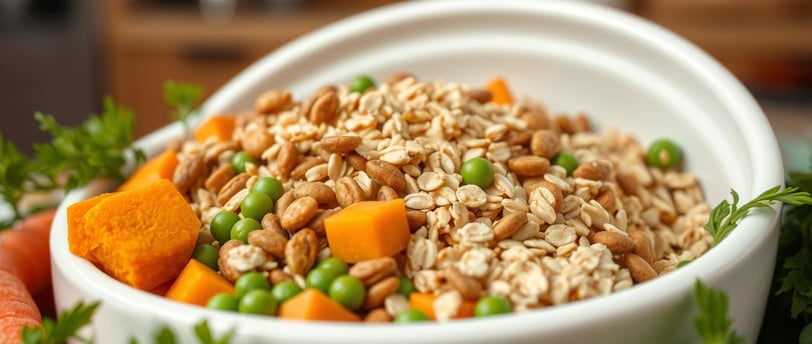A Balanced Dog Diet: What Does It Look Like?
A balanced dog diet includes protein, carbohydrates, fats, vitamins, and minerals in appropriate proportions. It supports overall health, energy, and longevity, tailored to a dog's age, size, and activity level.
The Canine Chronicles
9/6/20249 min read


In recent years, pet owners have learned how crucial it is to feed their dogs a nutritious and balanced diet.
With so many dog food choices available, picking the right one can be tough.
This article will cover the key parts of a balanced dog diet.
It will also help you make sure your pet gets the best nutrition.
Key Takeaways
A balanced dog diet includes the right amounts of proteins, fats, carbohydrates, vitamins, and minerals.
AAFCO guidelines set the nutritional standards for complete and balanced dog food.
Dogs' energy needs change with their age, activity level, and health.
High-quality protein and healthy fats are key for a dog's health.
Adding fresh, whole ingredients to your dog's diet can boost their health.
So, what makes up a balanced dog diet, and how do you know your dog is getting all the nutrients they need? Let's explore the world of dog nutrition together. We'll find out the secrets to a healthy, complete dog diet.
Importance of a Balanced Diet for Dogs
Feeding your dog a balanced diet is key for their health and happiness. A diet full of dog nutrition helps with their body's functions. It keeps their skin and coat healthy and boosts their immune system. Knowing about wholesome dog meals and canine balanced diet helps your dog live well.
Role of Essential Nutrients
Proteins, fats, carbohydrates, vitamins, and minerals are crucial for your dog's health. They help your pet's cells work right, fix tissues, and keep the body running smoothly. A healthy dog food with these nutrients lets your dog be their best and live a long, active life.
Benefits of a Wholesome Diet
Feeding your dog a complete dog diet with quality ingredients has many benefits. It makes their coat shiny, keeps their immune system strong, and boosts their energy. Following a dog feeding guide for a canine balanced diet keeps your dog happy and healthy.
AAFCO Guidelines for Balanced Dog Food
The Association of American Feed Control Officials (AAFCO) sets important guidelines for dog diets. They are a private, nonprofit group. They define what dogs need at different life stages, from growing up to being adults.
AAFCO Nutrient Requirements
AAFCO lists the key parts of a balanced dog food. These include water, carbs, vitamins, minerals, fats, and proteins. This helps pet owners pick the right food for their dogs, whether they're young or adults.
Nutritional Adequacy Statement
The Nutritional Adequacy Statement from AAFCO is very helpful. It tells pet owners which foods meet their dog's daily needs. This is important for dogs at different life stages, like puppies, breeding dogs, or adults.
"AAFCO's guidelines and Nutritional Adequacy Statement serve as a reliable roadmap for pet owners, ensuring that their canine companions receive a balanced and complete diet."
Following AAFCO's rules, pet food makers can make top-quality, nutritious food. This meets the special needs of dogs at all life stages. It helps pet owners choose well and gives their dogs the right diet.
Energy Requirements for Dogs
Keeping your dog healthy and full of energy is key. Dogs need different amounts of energy based on many things. Knowing these factors helps make sure your dog gets the right calories for their daily life and health.
Factors Affecting Energy Needs
A dog's energy needs change due to their growth stage, reproductive status, age, activity level, breed, and any medical or behavioral conditions they have. Puppies need lots of energy for their fast growth and development. Senior dogs might need less energy. Active dogs or working breeds need more dog energy requirements than less active dogs.
Also, a dog's canine caloric needs can change because of their metabolism and any medical issues. It's important to talk to your vet to figure out what your dog needs. They can help make sure your dog's diet has the right nutrients and calories.
"A balanced diet that meets a dog's energy requirements is essential for maintaining their overall health and well-being."
Knowing what affects your dog's energy needs helps you make better choices for their diet. This ensures they get the right calories and nutrients to stay healthy.
Proteins in Dog Food
Proteins are key for your dog's diet. They help build and keep up important body parts like cartilage, muscles, and skin. Dogs get essential amino acids from animal proteins, which they can't make themselves.
Sources of Protein in Dog Food
There are many protein sources for dogs, including:
Chicken, beef, or lamb as the primary protein sources
Fish, such as salmon or tuna, which provide high-quality proteins
Eggs, which are an excellent source of complete, bioavailable protein
Plant-based proteins, like soy, peas, or lentils, which can supplement animal-based proteins
Crude Protein Explained
"Crude protein" means the total protein in dog food. But it doesn't tell you how good or valuable the protein is. What matters more is how well your dog can use the protein.
Protein Quality and Requirements
For a balanced diet, dogs might need different proteins to get all the amino acids they need. The quality of protein is key. It should be easy to digest and have a high biological value. This ensures your dog gets the best protein quality for dogs.
Click here for brain training for your dog


"A balanced, high-quality diet is essential for your dog's overall health and well-being."
Fats in Dog Food
Fats are key in your dog's diet. They give a lot of energy and help absorb important vitamins. They also make your dog's food taste better and keep their coat shiny and soft.
Importance of Healthy Fats
Omega-3 and omega-6 fatty acids are vital for your dog's health. They support the immune system, heart, and skin and coat health.
Sources of Healthy Fats
Fish oils from salmon or mackerel are great for omega-3 fatty acids. Meat like chicken or beef gives omega-6 fatty acids. Adding different healthy fats to your dog's diet meets their needs and gives them the fats they need.
It's important to feed your dog a balanced diet with the right fats. This keeps them healthy and full of energy.
Carbohydrates and Fiber in Dog Food
Carbohydrates and fiber are key for a balanced dog diet. They give energy and help with digestion. Fiber keeps bowel movements regular and supports a healthy gut.
Whole grains, fruits, and veggies are great for dog carbohydrate requirements. They give your pup energy and dietary fiber benefits.
Fiber is vital for canine fiber needs. It aids digestion, prevents constipation, and supports a healthy gut. Sources of carbs and fiber for dogs include whole wheat, brown rice, oats, pumpkin, and berries.
"Carbohydrates and fiber are crucial components of a balanced dog diet, providing energy, supporting digestive health, and promoting overall well-being."
Adding the right sources of carbs and fiber for dogs ensures your dog gets a complete and healthy diet. This meets their dog carbohydrate requirements and canine fiber needs.


Vitamins and Minerals in Dog Food
Vitamins and minerals are key for your dog's health and happiness. They help with everything from seeing well to fighting off sickness. A diet full of fresh, whole foods makes sure your dog gets all the vitamins and minerals they need.
Essential Vitamins for Dogs
Some important vitamins dogs need are:
Vitamin A: Helps with vision, skin, and fighting off illness
Vitamin C: Helps heal wounds and boost the immune system
Vitamin D: Important for strong bones and teeth
Vitamin E: Protects cells from harm
B Vitamins: Helps with energy, nerves, and making red blood cells
Essential Minerals for Dogs
Minerals are also crucial for dogs:
Calcium: Needed for bones, teeth, muscles, and nerves
Phosphorus: Helps with bones and muscles
Magnesium: Important for energy, muscles, and nerves
Potassium: Keeps fluids balanced and supports muscles and nerves
Sodium and Chloride: Helps with fluid balance and nerve and muscle work
Feeding your dog a balanced diet with lots of fresh, whole foods makes sure they get the vitamins and minerals they need to be healthy.
what does a balanced dog diet look like
Creating a balanced diet for your dog is key for their health and happiness. It should mix high-quality protein, healthy fats, carbs, vitamins, and minerals. This meets their special nutritional needs.
Components of a Balanced Diet
A balanced dog diet usually has:
Lean meats, like muscle tissue, which give digestible protein and important amino acids
Whole grains, fruits, and veggies for phytonutrients, fiber, and more vitamins and minerals
Healthy fats, like fish oil or plant-based oils, for skin and coat health
Essential vitamins and minerals for body functions
Benefits of Fresh, Whole Ingredients
Using fresh, whole ingredients in your dog's diet brings many benefits. These include better digestion, a shinier coat, and more energy. Dog nutrition from fresh ingredients helps your pet thrive and flourish.
"A balanced diet rich in components of a balanced dog diet can support your dog's overall well-being and help them reach their full potential."
By giving your dog a balanced diet with benefits of whole food diet for dogs, they get the best nutrition. This ensures they live a happy, healthy life.

Choosing Quality Ingredients
Choosing the right dog food is key for your pet's health. Stay away from ultra-processed or low-quality foods. They might not give your pet the nutrients they need. Instead, read pet food labels well and look for the main protein sources.
Reading Dog Food Labels
Understanding pet food labels can seem hard, but it's vital for your dog's health. Check for a nutritional adequacy statement from the Association of American Feed Control Officials (AAFCO). This shows the food is balanced and complete for your dog's life stage.
Identifying Protein Sources
Meat should be the first ingredient, as it's the main protein source.
Avoid foods with plant-based proteins like corn or soy first, as they're lower quality.
Choose whole, recognizable proteins like chicken, beef, or fish over vague "meat" or "animal" proteins.
Talking to your vet or a veterinary nutritionist can help you pick the best food for your dog. They can guide you in choosing high-quality dog food that fits your pet's needs.
"A balanced diet is essential for a dog's overall health and well-being."
Conclusion
Feeding your dog a balanced diet is key to their health and happiness. Knowing what makes a diet good, like proteins, healthy fats, carbohydrates, vitamins, and minerals, helps them stay healthy. Always pick dog food that follows AAFCO guidelines. Also, talk to your vet or a pet nutrition expert to find the best diet for your dog.
A balanced dog diet should have many nutritious ingredients that support your dog's energy, immune system, and health. By focusing on high-quality dog nutrition, your dog can live a long, happy life.
Keeping an eye on your dog's diet is important, but it's worth it. By giving your dog the best balanced dog diet, they will be a happy, energetic, and lively friend for many years.
FAQ
What are the key components of a balanced dog diet?
A balanced dog diet includes high-quality protein, healthy fats, carbs, vitamins, and minerals. You should feed your dog meat, fish, whole grains, fruits, and veggies. These foods give your dog the nutrients they need for good health.
What are the benefits of a wholesome dog diet?
A wholesome diet makes your dog's coat shiny and skin healthy. It also boosts their immune system and makes them happier and more active.
What guidelines does AAFCO set for dog food?
AAFCO sets the rules for dog food ingredients and nutrients. They make sure pet food has the right nutrients for dogs at different life stages. They also have a statement that shows if a food meets your dog's daily nutrient needs.
How do I determine my dog's energy requirements?
Your dog's energy needs depend on their growth, age, activity level, breed, and health. It's important to feed them the right amount of energy to keep them healthy. This prevents weight gain or not getting enough nutrients.
What is the role of proteins in a dog's diet?
Proteins are key for your dog's health. They help build and keep up muscles, skin, hair, nails, and blood. Feeding your dog animal-based proteins gives them the amino acids they need that they can't make themselves.
Why are healthy fats important for dogs?
Healthy fats are vital for your dog. They give them energy, help absorb vitamins, and make their food taste better. They need the right mix of omega-3 and omega-6 fats for health and fighting inflammation.
What is the role of carbohydrates and fiber in a dog's diet?
Carbs and fiber give your dog energy and keep their digestive system healthy. Fiber helps with bowel movements and keeps their gut healthy. Whole grains, fruits, and veggies are good sources of carbs and fiber for your dog.
What are the essential vitamins and minerals for dogs?
Vitamins like A, C, D, E, and B support your dog's health in many ways. Minerals like calcium, phosphorus, and potassium are important for bones, muscles, and fluids. They help with cell function and keeping the body balanced.
How do I identify high-quality dog food?
Choose dog food with good ingredients and avoid ultra-processed foods. Check the labels to see the main protein source and make sure meat is first. Also, look for an AAFCO statement to ensure the food is balanced for your dog's needs.
When should I consult a veterinarian or pet nutrition expert?
Talk to a vet or a pet nutrition expert if your dog has special health needs. They can give you advice on what food is best for your dog. This ensures your dog gets the right diet for their health.
Source Links
Further reading
Superfoods for dogs
Best omega 3 supplement for dogs
7 natural ways to boost your dogs immune system
Thanks and best regards
The Canine Chronicles
Click here for a healthy canine!
Disclaimer: This post may contain affiliate links. We may earn a commission from qualifying purchases at no extra cost to you. We only recommend products we've personally used and trust. Your support helps us maintain this site. Thank you.
Disclaimer: The information provided is for educational purposes only and is not intended to diagnose, treat, cure, or prevent any disease. Always consult with a qualified healthcare professional before starting any supplement regimen or making changes to your pets health routine.
